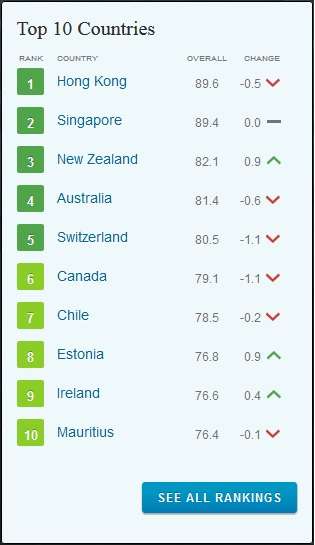U.S. No Longer Slides in Economic Freedom Ratings, But Still Only 'Mostly Free'
Whew. We won't have to match ourselves against Bulgaria anytime soon.

The good news from the debut of the 2015 Index of Economic Freedom is that the United States has stopped its free fall down the rankings. For those of us living here, that's a bit of relief, suggesting that we won't have to actually compete with Bulgaria (number 55) for who sucks slightly less anytime soon. The bad news is that the U.S. remains stuck at number 12. That earns us only "mostly free" status and puts us out of the running with economically more liberated economies like those of Hong Kong, Singapore, New Zealand, Australia, and Switzerland. It also reaffirms the archaic status of socialist jokes about Canada, which slides in six whole slots above us. That's a shame, because I have a good one that looks like it's permanently out of circulation.
The Index, compiled by The Heritage Foundation and the Wall Street Journal, sums up the land of the mostly free thusly:
The United States' economic freedom score is 76.2, making its economy the 12th freest in the 2015 Index. Its score is 0.7 point higher than last year, with modest gains in six of the 10 economic freedoms, including control of government spending, outweighing a slight decline in business freedom.
Although the precipitous downward spiral in U.S. economic freedom since 2008 has come to a halt in the 2015 Index, a 1.6-point decline in overall economic freedom over the past five years reflects broad-based deteriorations in key policy areas, particularly those related to upholding the rule of law and limited government. Continuing to trail such comparable economies as Australia, New Zealand, Switzerland, and Canada, America has been ranked "mostly free" since 2010.
Specifically, with regard to the "rule of law," the Index notes, "High levels of government spending and the expansion and complexity of the government's regulatory agenda have increased opportunities for political favoritism and cronyism."
That's an acknowledgement of a fact that everybody but politicians seems to know: "When buying and selling are controlled by legislation, the first things to be bought and sold are legislators," as P.J. O'Rourke puts it. I would modify that to note that the most common thing to be bought and sold are the inspectors, regulators, and tax collectors who apply the red tape and have the opportunity to unofficially sell exemptions and indulgences. New York City went down this path decades ago, and developed a whole industry—expediters—to grease the interactions of businesses with bureaucracy.
Complicated regulations, along with high taxes, also drive people into the shadow economy where they operate under the radar. That can become a habit after a while, as people grow used to operating off the books.
The Index of Economic Freedom isn't the only source to fault America's slide from the top ranks of free market economies. In December, the Fraser Institute released the latest edition of its Economic Freedom of North America report, which noted that Canada had expanded its lead over the U.S.


Show Comments (108)